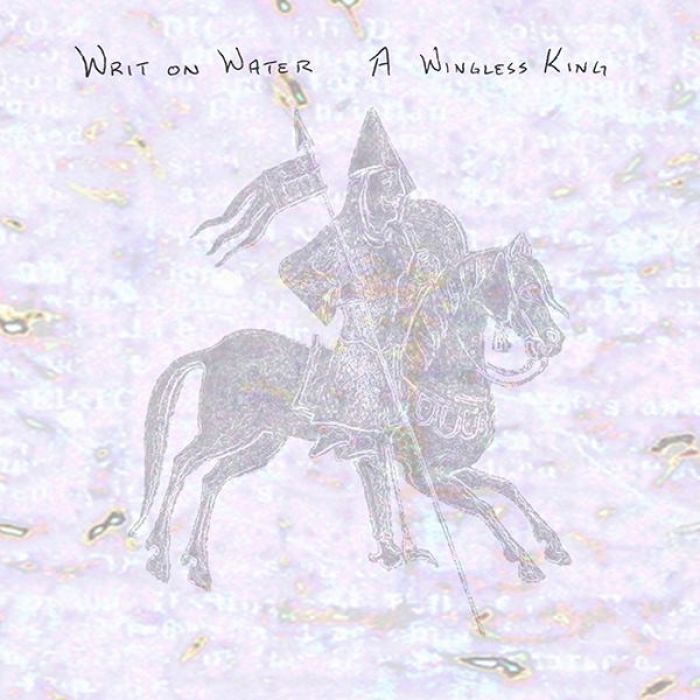A Wingless King by Writ On Water (Review)

It’s been 8 years since Writ On Water has released anything new, their last release being 2000’s Pelléas EP. But even back then, their music was stuck even further in the past, specifically in the halcyon days of 4AD Records, and artists such as Cocteau Twins and This Mortal Coil. Therefore, it should come as no shock that A Wingless King, the group’s newest full-length, sounds somewhat like a musical artifact unstuck in time.
A gloomily atmospheric post-punk/4AD tone permeates the entire disc, even on the more “relaxed” numbers such as album opener “Angie Swirls In Pastel Summer” and “Wondertime.” And on songs like “Dead Give Away” and the dreamy closing track “Things Only Heaven Knows,” it coalesces into something quite spell-binding. All of which was something I was more or less prepared for.
However, what I wasn’t necessarily prepared for was how experimental and left-of-center A Wingless King would be. Their previous releases, specifically 1992’s Sylph, revealed that the group wasn’t content with simply being clones, but rather, would venture out into left field from time to time. But that’s even truer on A Wingless King.
Such experimentation doesn’t always work, though. There are times when I find myself wondering if some of the album’s more obtuse moments are the result of this more experimental mindset, or rather, if I’m listening to Jeff MacKey and Daniel Johnson (and their collaborators) shake off some of the rust and dust that’s bound to gather when you’re essentially on hiatus for nearly a decade.
“A Midsummer Wish” and “The Last Night Of Her Sleep” strike me as better ideas than actual songs. There are lovely moments in those songs, such as the glittering guitar fragments that conjure up a certain twilit contemplation on “The Last Night Of Her Sleep,” but even at around three minutes apiece, the songs last a bit longer than they’re capable of sustaining.
But on other tracks, heading off the beaten path, if only a little bit, yields more interesting results. “Ancestor,” with its opening chants and industrial undertones that give way to searing, gothic guitars (somewhere, Mike VanPortfleet is proud/jealous) and crashing drums, took me aback (in a good way), while the lyrics conjure up the sort of existential sturm und drang you find in Joy Division’s finest moments:
I want to forget, I want to start over
I want to wash this life off me
History cannot be undone
And some things never get clean
Too many sins of too many fathers
Settled on the heads of too many sons
I want to break away from myself
But there’s nowhere else to run
Am I digging toward an early grave?
My fingers nearly dead from frost
Does anything remain of me to save?
I’ve lost track of what I’ve lost
I want to crawl into the womb
I want to re-emerge as someone else
“The Laughter Ceases” meanders from crisp drums and bowed bassline to shimmery synths and a vaguely Oriental flute melody in the finest David Sylvian tradition; meanwhile, the vocals bring to mind nothing less than Controlled Bleeding at their monastic best (think Songs From The Ashes or Golgotha) as MacKey intones “She climbs into the sky again/And splits into a million pieces/The stars are smiling, laughing, dancing in the heavens/‘Til suddenly the laughing ceases.”
While listening to the nearly eleven-minute “Bittersuite,” you hear both sides of the group’s experimental proclivities. Consisting of several movements, the song is certainly sprawling and meandering, and feels less like a composed piece and more like a resting place for ideas that couldn’t quite survive as songs in their own right. However, within the movements there are interesting sketches and ideas: for example, the third movement, in which a forlorn flute drifts over a desolate sonic wasteland of creeping bass and distorted guitar.
There’s always bound to be curiosity, excitement, and anxiety when a band returns after a long period of inactivity. Writ On Water’s return may not be as heralded as some of 2008’s other returns (e.g., Portishead, My Bloody Valentine), but for some of us, it’s no less a reason for interest — and concern. For their return, however, Writ On Water has chosen to pick up right where they left off, going against the notion that the only option one has after such a long disappearance is reinvention.
Overall, A Wingless King is proof that MacKey and Johnson have made a wise decision. But there’s also plenty to show that the band isn’t completely back; their sound is a little rusty, a little faded around the edges. Given the group’s attempts to make up for lost time, though — in addition to A Wingless King, they’ll also be releasing two EPs later this year — that should give them ample opportunity to work out any remaining kinks resulting from their too-long absence.